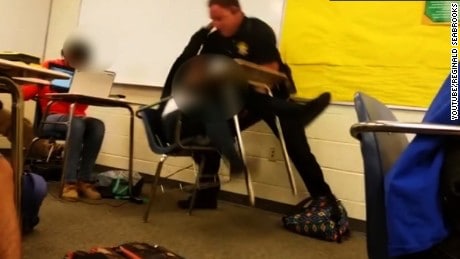Power Struggles, Negative Contact, and Police Brutality
Share via A sixteen year-old girl was forcibly removed from her South Carolina classroom by a school resource officer on Monday, October 26, 2015. Three separate videos, taken by students, are being scrutinized for evidence of police brutality. Reports say the girl had been disruptive and refused several requests by the teacher to leave the classroom. She is being charged with disruption in school.
A sixteen year-old girl was forcibly removed from her South Carolina classroom by a school resource officer on Monday, October 26, 2015. Three separate videos, taken by students, are being scrutinized for evidence of police brutality. Reports say the girl had been disruptive and refused several requests by the teacher to leave the classroom. She is being charged with disruption in school.
It usually starts many hours, or days earlier with something as innocuous as fidgeting and difficulty focusing on tasks.
Then comes a snarky remark or rolling eyes, and boredom. Next, the student taunts or persuades another student to get involved but denies doing anything wrong, or blames someone else for it. If this doesn’t work, then outright verbal disrespect for the teacher usually gets it done. If that still isn’t enough, more aggressive acting out will precipitate a showdown. In this case, it came down to student vs. police officer in a show of force.
The officer prevailed in this show of force. And, he lost. Big time.
He was suspended without pay, is now being scrutinized for excessive force, and may lose his job.
For eleven years I worked as a psychologist at a mental health facility that had a psychiatric inpatient hospital. I took turns being on-call to do mandatory post-incident evaluations and debriefs whenever a patient was forcibly put in isolation. With very few exceptions, what ended in a show of force started many hours before as an innocuous attempt by a patient to get positive contact but deteriorated into an un-winnable power struggle.
Of the six personality types discovered by Dr. Taibi Kahler, the Rebel in distress is more likely to get in trouble in school, be diagnosed with childhood disruptive disorders like Oppositional-Defiant Disorder or Conduct Disorder, more likely to show symptoms of Attention Deficit Disorder – Hyperactive type (ADD-H), and more likely to get in trouble with the law.
Rebels are positively motivated by Contact – lively, upbeat, energetic exchanges that involve movement and stimulation. They are kinesthetic learners and are externally motivated. When any personality type doesn’t get his or her needs met positively, Dr. Kahler discovered that they will get these very same needs met negatively, with or without awareness.
So what does negative contact look like? Re-read the second and third paragraphs of this post. The whole purpose of these behaviors is to get a negative reaction out of others.
Those who find themselves in frequent power struggles with Rebels would be wise to recognize this simple fact: In distress Rebels don’t care if they get hurt, as long as you do too.
If it comes down to a show of force, you are most likely to lose because they simply don’t care about consequences. This is what happened to the school resource officer in South Carolina. This is what happens thousands of times a day in every school, home, and workplace.
Develop your skills in providing positive contact to Rebels and you can transform your power struggles into meaningful relationships.
Here is a great book about how to connect with every personality type in the classroom. Here’s a book about how to do it in the workplace.
If you want to get trained in how to deploy these skills in your world, contact us.
Follow @NextNate on Twitter
Connect with Nate on LinkedIn
 Buy Nate’s book, Beyond Drama: Transcending Energy Vampires
Buy Nate’s book, Beyond Drama: Transcending Energy Vampires
Visit Nate’s Speaker Page, or contact us about booking Dr. Regier for a speaking engagement.
Book Your Next Keynote Speaker

Author and Co-founder of Next Element, Dr. Nate Regier is available to speak at your upcoming event.
Submit a Speaker RequestListen to Nate on The Compassionate Accountability Podcast
 Listen to the Podcast
Listen to the Podcast

0 Comments
Add comment